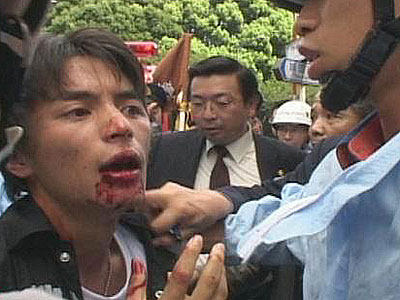|
One of the more memorable incidents during the making of the film occurred on August 15, 2005, the 60th anniversary of the end of the Second World War. Li captured Japanese worshipers beating two student-like protestors they took to be Chinese.

A scene from Yasukuni (Photo from sina.com)
"I never expected to see such physical conflict inside the shrine," he said. "I hid behind the camera and was too nervous to adjust the camera lens. I hoped they wouldn't notice that I was the only Chinese there. The protestors' faces were bleeding, and they were Japanese."
What also went beyond his expectations was the period of shooting - ten years in total! In the very beginning, Li worked alone without any patronage, because of the controversial topic. During his worst financial period, Li was unable even to pay his apartment rent.
But some two years ago, the Beijing Zhongkun Group decided to invest 3 million yuan (about $380,000) to help Li and his crew. When the film was almost complete, Li managed to get a Japanese cultural fund. Li was quite moved when the fund reassured him that it would not withdraw its sponsorship during the period of controversy.
Fortunately, Li's hard work paid off. Yasukuni made a stunning debut at last year's Busan International Film Festival. The Hollywood Reporter says that the film "is a penetrating documentary illustrating the complexity of Japan's war legacy" and "ignited passionate responses from the audience". Li and his work captured the limelight when the presidents of the 2008 Sundance Film Festival and the 58th Berlin Film Festival invited him to attend.
At the Sundance Film Festival on January 18, viewers spoke highly of the documentary, saying that it did a good job striking middle ground between different points of view by simply telling the facts.
"The Sundance Film Festival is the most influential and authoritative independent film festival in the world. I'm happy to see that American audience can think deeply about what the war legacy is, and why Yasukuni is still a complex issue in Asia," Li told Beijing Review. "The topic is not merely about Asia but about the whole world. People are more concerned about what peace is and how to look at the history.
"I'm confident that it will receive a warm welcome from audiences in Europe as well, for the Berlin Film Festival always pays great attention to the influence that history brings to reality and the future."
This year's festival, according to the organizers, will screen a retrospective consisting of eight films that recall the impact of the Vietnam conflict on U.S. cinema.
"The president of the festival, who watched the premiere in Busan, believes that Yasukuni is a powerful film in terms of rethinking the war. To this extent, our film coincidentally echoes this program. Japan seems to fall far behind Germany on reviewing its war responsibility. I'm sure that the Europeans, especially the German audience, will be stimulated by the Yasukuni issue to rethink history. It is hard to judge anyone, so I just wanted to show how many sides there are to stories and to people," he stated.
The film is scheduled to open in Japan on April 12, but the China dates have yet to be decided.
"It's normal to hear all kinds of comments, positive or negative, after the media preview in Japan," he said. "I don't mean to teach Japanese how to review history, but am hoping that people who see it will also look at themselves.
"Since the worship of the Yasukuni Shrine is one of the toughest barriers to smooth bilateral or multilateral relations between Japan and its neighbors, the film will probably play an important role in connecting Japan, China and South Korea on the issue. I hope the launches in China and South Korea are held simultaneously with Japan. It will be interesting to see different responses in different countries to the same film, right?"
Profile of Li Ying
Born in 1963, Li began directing documentary films for CCTV in 1984, and then moved to Japan in 1989. In 1993, he co-founded Dragon Films Inc. to produce TV programs and films.
His first film 2H was made in 1998 and won awards at the 1999 Berlin Film Festival and the 2000 Hong Kong Film Festival. His other credits include Flying and Flying (2000); Dream Cuisine (2002), Mona Lisa (2005) and Yasukuni (2007). | 